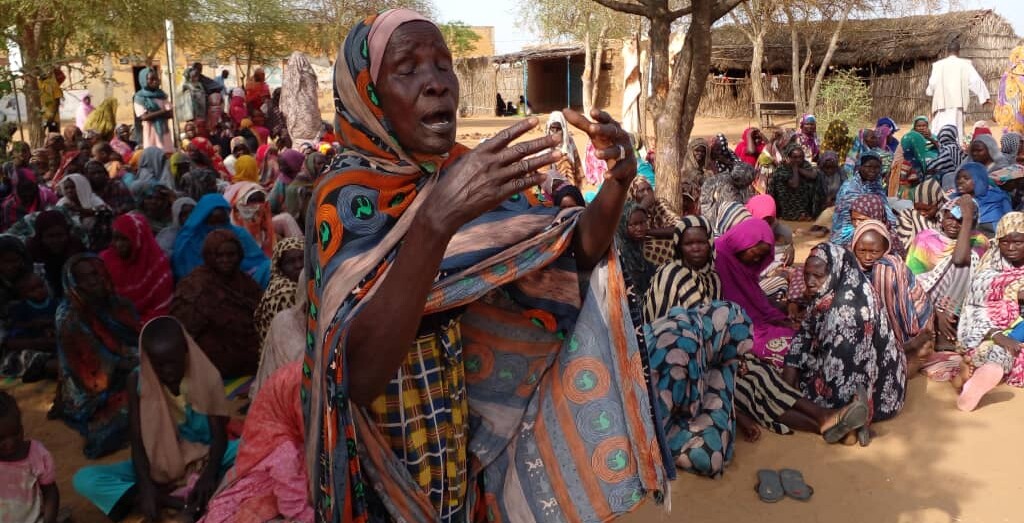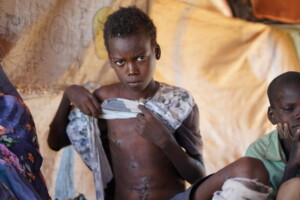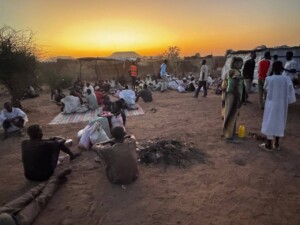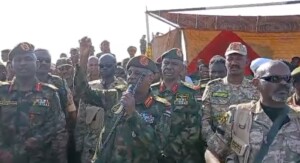Airstrike sets North Darfur hospital ablaze

People gather at the centre of the El Salam displaced camp (also known as Abuja camp) near El Fasher in North Darfur, August 2023 (File photo: RD)
The Sudanese Armed Forces (SAF) reportedly shot down a Rapid Support Forces (RSF) drone in El Fasher, capital of North Darfur, on Tuesday, while the RSF continued to fire shells at multiple neighbourhoods in the city. A SAF airstrike reportedly set a hospital in Kutum on fire that day.
A listener in El Fasher told Radio Dabanga that the SAF shot down a drone belonging to the RSF in El Salam, a neighbourhood in the southern part of the city, on Tuesday, while the RSF fired several artillery shells at El Fasher yesterday and today.
He added that SAF warplanes bombed the hospital of Kutum, northwest of El Fasher on Tuesday evening, “killing and injuring many patients and destroying parts of the hospital”.
Activists shared videos on social media showing the aftermath of the airstrike, which engulfed the maternity ward of the hospital in flames and smoke. Kutum came under control of the RSF in June last year.
A resident of El Salam neighbourhood reported that medical services in the local hospital have deteriorated due to the influx of displaced people, adding that “there is a lack of medicines, gauze, and medical supplies”.
A person in a nearby village was killed as he was tracking down a stolen herd of cows taken towards El Fasher. “The herd was recovered, but a member of the search posse was killed in an exchange of fire with the thieves.”
Displaced
I am profoundly distressed by the humanitarian situation in El Fasher, where the noose of war is tightening its stranglehold on a civilian population that is under attack from all sides.
Clémentine Nkweta-Salami, UN Resident and Humanitarian Coordinator for Sudan, on May 30
The Abu Shouk camp Emergency Room in El Fasher issued a report yesterday detailing the conditions of the displaced in the shelter centres and the International Rescue Committee (IRC) health centre, following weeks of violence in and around El Fasher.
The emergency room team conducted a field survey of the shelter centres in Abu Shouk camp, the IRC health centre, and nearby areas on Tuesday, and said it counted 594 families currently living in shelters. “The inventory includes in total 20 shelter centres and health centres, including El Salam Schools 2 to 17 and the IRC centre.”
“The situation inside the shelter centres is dire, with severe shortages of water, food, and health services, particularly for children. Three centres (Al Salam Schools 4, 5, and 17) were evacuated after attacks by the RSF last week.”
In a statement today, the United Nations Resident and Humanitarian Coordinator for Sudan, Clementine Nkweta-Salami, said she was “profoundly distressed by the humanitarian situation in El Fasher, where the noose of war is tightening its stranglehold on a civilian population that is under attack from all sides.
“We are receiving deeply worrying reports that medical facilities, displacement camps, and critical civilian infrastructure have been targeted by parties to the conflict. Many parts of El Fasher have been left without electricity or water. A growing proportion of the population has limited access to basic necessities and essential services, including food and healthcare.”
In a press briefing on Tuesday, UN Secretary-General spokesperson Stéphane Dujarric told reporters that according to the International Organization for Migration (IOM), nearly 58,000 people have been displaced from El Fasher since April 1. “Many more people, including children and elderly people, are unable or are being prevented from moving to safer areas.”
Battles continue in El Fasher between the SAF and their allies against the RSF, which have imposed a siege on the city since last month, resulting in hundreds of deaths and injuries from artillery and airstrikes.











 and then
and then